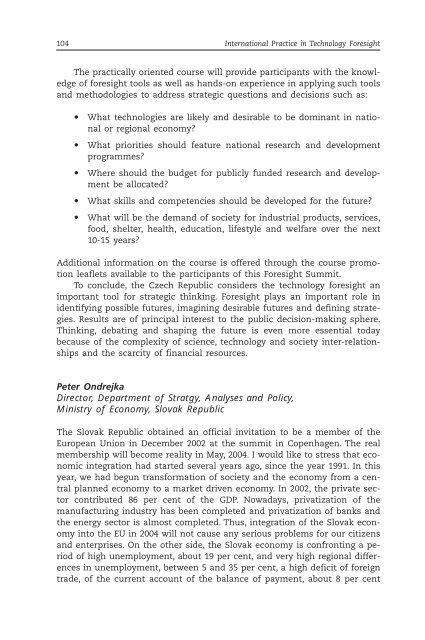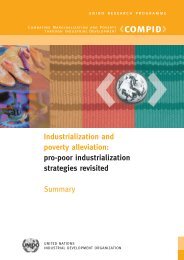TECHNOLOGY FORESIGHT SUMMIT - Unido
TECHNOLOGY FORESIGHT SUMMIT - Unido
TECHNOLOGY FORESIGHT SUMMIT - Unido
Create successful ePaper yourself
Turn your PDF publications into a flip-book with our unique Google optimized e-Paper software.
104 International Practice in Technology Foresight<br />
The practically oriented course will provide participants with the knowledge<br />
of foresight tools as well as hands-on experience in applying such tools<br />
and methodologies to address strategic questions and decisions such as:<br />
<br />
<br />
<br />
<br />
<br />
What technologies are likely and desirable to be dominant in national<br />
or regional economy?<br />
What priorities should feature national research and development<br />
programmes?<br />
Where should the budget for publicly funded research and development<br />
be allocated?<br />
What skills and competencies should be developed for the future?<br />
What will be the demand of society for industrial products, services,<br />
food, shelter, health, education, lifestyle and welfare over the next<br />
10-15 years?<br />
Additional information on the course is offered through the course promotion<br />
leaflets available to the participants of this Foresight Summit.<br />
To conclude, the Czech Republic considers the technology foresight an<br />
important tool for strategic thinking. Foresight plays an important role in<br />
identifying possible futures, imagining desirable futures and defining strategies.<br />
Results are of principal interest to the public decision-making sphere.<br />
Thinking, debating and shaping the future is even more essential today<br />
because of the complexity of science, technology and society inter-relationships<br />
and the scarcity of financial resources.<br />
Peter Ondrejka<br />
Director, Department of Stratgy, Analyses and Policy,<br />
Ministry of Economy, Slovak Republic<br />
The Slovak Republic obtained an official invitation to be a member of the<br />
European Union in December 2002 at the summit in Copenhagen. The real<br />
membership will become reality in May, 2004. I would like to stress that economic<br />
integration had started several years ago, since the year 1991. In this<br />
year, we had begun transformation of society and the economy from a central<br />
planned economy to a market driven economy. In 2002, the private sector<br />
contributed 86 per cent of the GDP. Nowadays, privatization of the<br />
manufacturing industry has been completed and privatization of banks and<br />
the energy sector is almost completed. Thus, integration of the Slovak economy<br />
into the EU in 2004 will not cause any serious problems for our citizens<br />
and enterprises. On the other side, the Slovak economy is confronting a period<br />
of high unemployment, about 19 per cent, and very high regional differences<br />
in unemployment, between 5 and 35 per cent, a high deficit of foreign<br />
trade, of the current account of the balance of payment, about 8 per cent

















